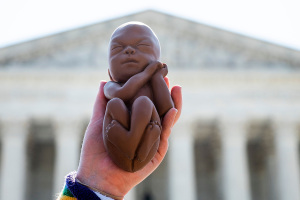Speciesism and Rights for Animals
Of Pigs and People
Five years ago, Florida voters amended their state constitution to guarantee the rights of a previously unprotected class: pregnant pigs. Specifically, the ballot initiative guaranteed pregnant sows "enough space within which to turn around."
Now, treating animals humanely is a moral imperative, especially for Christians; treating them as if they somehow were equivalent to humans is not. And, increasingly, that is what we are doing.
At the time of the initiative, bioethicist Wesley J. Smith noted that at, any given time, there are only 300 pregnant sows in the entire state. Of these, only a handful were not being provided the space required by the amendment.
So, the initiative was not being sponsored to eliminate animal cruelty. Instead, its goal was to establish a legal and political precedent that would help redefine the relationship between people and animals—and, in this case, bestow constitutional rights on animals.
The next big test for this campaign to turn animals into rights-bearing creatures is in California. There, animal-rights supporters are trying to get an initiative on the September 2008 ballot.
This initiative would extend the "rights" granted to Florida sows to the rest of the barnyard. It would, in effect, give animals a right to stand up, lie down, turn around, and fully extend their limbs.
Again, Christians ought to oppose cruelty toward animals and ensure that animals, including those we eat, are treated humanely.
But initiatives like this one and in Florida are not really about the humane treatment of animals—they are about blurring and eventually erasing the distinction between people and animals. They are about eradicating what animal-rights advocates call "speciesism."
Princeton ethicist Peter Singer defines "speciesism" as "a prejudice" that favors "the interests of members of one's own species . . . against those members of other species." Singer regards "speciesism" as being the moral equivalent of racism.
For Singer and company, the offense is not only that we treat animals badly—it is that we think that people are human and, thus, different than animals.
Christians need to beware, as well. A letter from a friend told me of a group in his church praying for the healing of pets, even laying on hands. Some Christians, who rightly love their animals, begin to think of them as humans, members of the family.
How far will the animal-rights movement go? Can you imagine pigs enjoying the right to life, liberty, and the pursuit of happiness? Don't laugh. Social changes in postmodern America happen very quickly—especially when couched in the language of rights. How quickly, for example, did abortion go from being a crime to a right? Or the demand by gays for marriage?
Worldviews matter. If you believe there is no God, then you believe there are no God-given rights. And to you, humans are indeed just one of many living accidents roaming the planet.
But we know better. And we know better than to cast human rights before swine.
_________________________________________________
From BreakPoint®, November 13, 2007, Copyright 2007, Prison Fellowship Ministries. Reprinted with the permission of Prison Fellowship Ministries. All rights reserved. May not be reproduced or distributed without the express written permission of Prison Fellowship Ministries. "BreakPoint®" and "Prison Fellowship Ministries®" are registered trademarks of Prison Fellowship



























